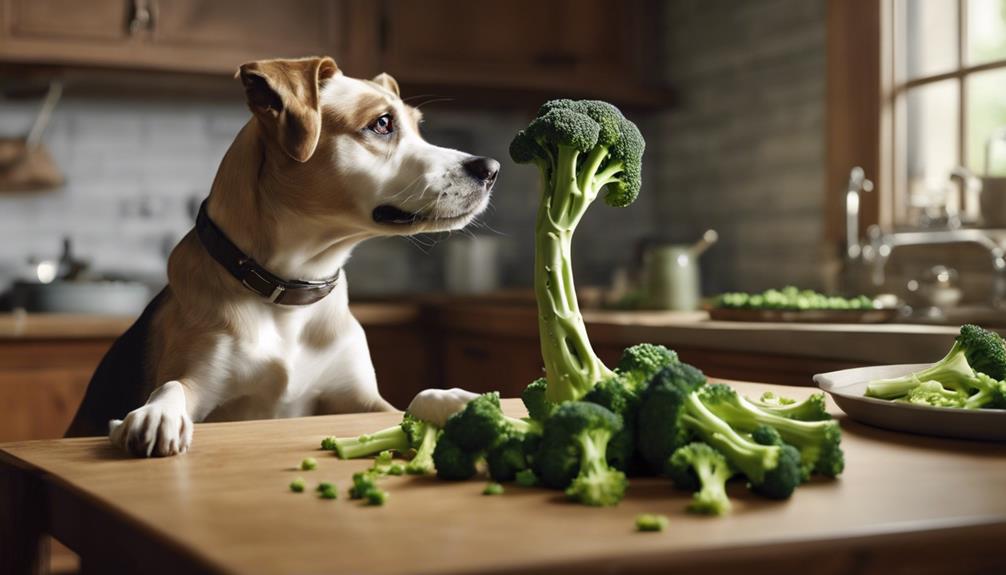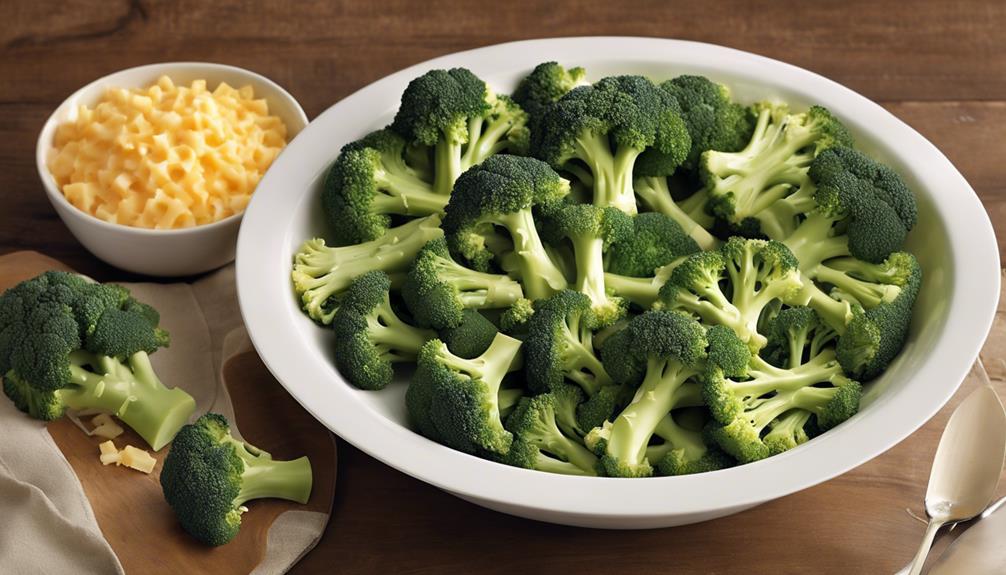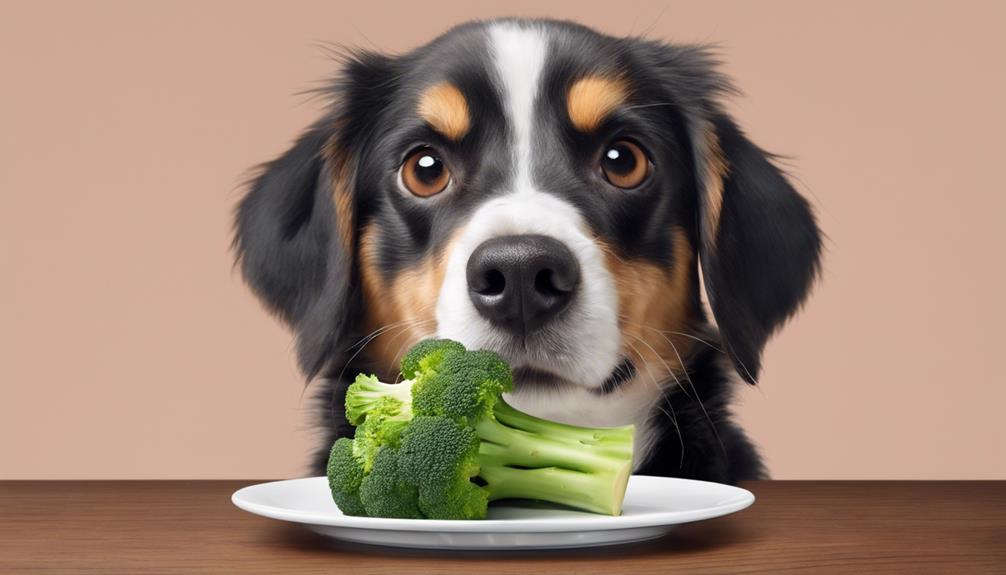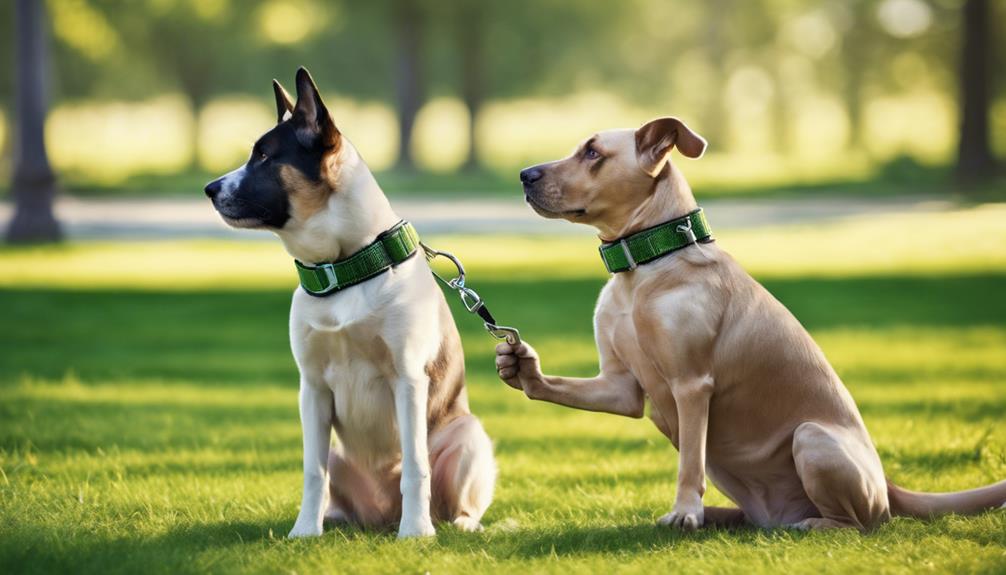Yes, dogs can have broccoli. It's a healthy treat rich in fiber and vitamin C, beneficial for their digestion and immune system. But be cautious. Broccoli contains isothiocyanates that might upset their stomachs. Small portions and monitoring are key. Cut it into tiny bits to prevent choking. Keep an eye on them while they eat. Stick to a small amount, around 10% of their daily calories. If all goes well, more on how to serve broccoli safely and deliciously. Your pup's health matters most!
Key Takeaways
- Broccoli is safe for dogs in moderation.
- Rich in fiber and vitamin C.
- Cut into small pieces to prevent choking.
- Monitor for any adverse reactions.
- Consult a vet for proper feeding guidelines.
Potential Benefits of Broccoli for Dogs
Broccoli offers dogs a vital source of fiber and vitamin C, promoting digestive health and bolstering their immune system. This green veggie isn't only safe for dogs but also a healthy treat option, low in fat and beneficial for overall well-being.
Whether raw or cooked, broccoli can be a nutritious addition to your furry friend's diet. It's important to bear in mind that importance is key when it comes to feeding dogs broccoli, as it shouldn't exceed 10% of their daily intake.
While broccoli can provide essential nutrients as occasional treats, it's essential to monitor your dog's reaction to avoid potential gastric irritation. Keeping an eye on how your dog responds to this veggie will help make certain they can enjoy the benefits of broccoli without any negative effects on their stomach.
Risks Associated With Feeding Dogs Broccoli

While broccoli can provide dogs with essential nutrients, it's important to keep in mind the risks associated with feeding them this green veggie. Here are some key points to keep in mind when deciding whether to incorporate broccoli into your dog's diet:
- Gastric Irritation: Broccoli contains isothiocyanates that can result in gastric irritation in dogs, especially if consumed in large quantities. This can lead to digestive issues and discomfort in your furry companion.
- Moderation is Key: Dogs should only consume broccoli in small amounts to avoid gastrointestinal upset. Introducing broccoli gradually and observing your dog's response can help determine a safe amount for them to ingest.
- Symptoms to Watch For: Be on the lookout for signs of broccoli toxicity in your dog, such as abdominal pain and vomiting. If you observe any unusual symptoms after your dog consumes broccoli, it's important to consult a vet to safeguard their safety and well-being.
How to Safely Feed Broccoli to Dogs

Let's talk about safely including broccoli in our furry friends' diet. Remember to cut the broccoli into small pieces to avoid choking issues.
It's also important to supervise their munching to prevent any discomfort.
Broccoli for Doggos
When incorporating broccoli into your dog's diet, it's important to take into account their individual tolerance and start with small portions to monitor any adverse reactions.
Here are some tips for safely feeding broccoli to your furry friend:
- Cut broccoli into small, manageable pieces to prevent choking.
- Offer broccoli in small quantities as a healthy treat.
- Watch out for signs of digestive distress or gastrointestinal issues after feeding your dog broccoli.
Safe Serving Sizes
In order to guarantee the safe feeding of broccoli to dogs, it is crucial to take into account the suitable serving sizes based on their daily intake. It is recommended to start with small portions of broccoli and carefully monitor your dog's reactions. Cutting the broccoli into small, bite-size pieces can prevent choking hazards. Consulting a vet is advisable to determine the appropriate amount of broccoli for your dog, considering their size and overall health. The safe serving size of broccoli for dogs should be less than 10% of their daily intake. Begin with small servings and observe any negative reactions before increasing the quantity. Remember, each dog is different, so it's essential to find the right balance for your furry friend.
| Factors to Consider | Description |
|---|---|
| Safe Serving Size | Less than 10% of daily intake |
| Monitoring Reactions | Observe for tolerance |
| Consulting a Vet | Determine suitable amount |
Broccoli Serving Size Guidelines for Dogs

To ensure your dog's well-being, it's vital to stick to the recommended broccoli serving size of no more than 10% of their daily calorie intake. Broccoli can be a healthy treat option for dogs in moderation, but it's important to be mindful of potential choking hazards and digestive issues that may arise.
Here are some guidelines to help you determine the appropriate serving size for your furry friend:
- Consult Your Veterinarian: Seek guidance from your veterinarian on the right amount of broccoli for your dog based on factors like size, age, and overall health status.
- Monitor for Reactions: Introduce broccoli slowly and watch for any negative reactions or digestive problems such as vomiting or diarrhea.
- Cut into Small Pieces: To reduce the risk of choking, cut broccoli into small, bite-size pieces before offering it to your dog. Remember, moderation is key to ensuring that your dog can enjoy this nutritious treat safely.
Monitoring Dogs for Digestive Upset

When observing our furry friends after offering them broccoli, it's important to be on the lookout for signs of digestive distress such as gas, diarrhea, or constipation. If any of these symptoms arise, it may be necessary to adjust their diet accordingly to prevent further upset.
Digestive Symptoms to Watch
Monitoring dogs for digestive upset post-broccoli consumption is essential to detect early signs of gastrointestinal distress. Here are three digestive symptoms to watch for after feeding broccoli to your furry friend:
- Gas: If your dog experiences excessive flatulence after eating broccoli, it could indicate digestive upset.
- Diarrhea: Loose stools or increased frequency of bowel movements may suggest that your dog's digestive system is sensitive to broccoli.
- Constipation: On the other hand, if your dog has difficulty passing stool or shows signs of straining, it could be a sign of digestive issues post-broccoli consumption.
Being attentive to these symptoms can help you identify and address any digestive problems your dog may experience from eating broccoli.
Dietary Adjustments for Dogs
Upon feeding dogs broccoli, it is important to observe for any signs of digestive upset, such as gas, diarrhea, or constipation. To guarantee your furry friend's well-being, monitor the amount of broccoli provided, aiming to restrict it to approximately 10% of their daily diet. Overindulgence of broccoli can result in gastrointestinal distress for dogs. If you notice any negative reactions after feeding broccoli, seek veterinarian guidance promptly. Making necessary dietary adjustments under professional supervision can help in maintaining your dog's health and happiness. Remember, a balanced diet tailored to your dog's specific needs is vital for their overall well-being.
| Dietary Adjustments for Dogs | ||
|---|---|---|
| Monitor Amount | Limit Overindulgence | Veterinarian Guidance |
Alternatives to Broccoli for Dogs

Looking for healthy alternatives to broccoli for your furry companion? When it comes to providing nutritious substitutes for broccoli in your dog's diet, there are several options to think about:
- Carrots: These crunchy veggies are a safe alternative to broccoli, offering beta-carotene and fiber that are beneficial for your dog's health.
- Bell Peppers: If your dog enjoys a crunchy texture, bell peppers can be a great replacement for broccoli. They also provide a good amount of vitamin C, which is essential for your dog's immune system.
- Cucumbers: Low in calories and hydrating, cucumbers are an excellent choice to swap out broccoli in your dog's snacks. They offer essential nutrients and can be a revitalizing treat for your furry friend.
These alternatives not only add variety to your dog's diet but also provide essential nutrients like fiber, beta-carotene, and vitamin C that contribute to their overall well-being.
Preparing Broccoli for Dogs

When preparing broccoli for dogs, it is important to make sure it is cut into bite-size pieces to prevent choking hazards. Dogs can eat broccoli either raw or cooked, with steamed broccoli being a preferred option for easier digestion. Remember to avoid adding seasonings, oils, or salt to the broccoli when preparing it for your furry friend. It's vital to monitor your dog closely while they enjoy this treat to ensure they are not experiencing any distress. Broccoli should be given to dogs as a snack or treat, but it should not replace their regular balanced diet.
| Broccoli Preparation Tips for Dogs | |||
|---|---|---|---|
| Cut into bite-size pieces | Monitor for distress | Offer as a treat | Avoid seasonings |
| Dogs can eat raw or cooked broccoli | Watch for choking | Provide balanced | Prefer steamed |
| hazards | diet | broccoli |
Broccoli Treat Recipes for Dogs

As we explore Broccoli Treat Recipes for Dogs, discover delightful ways to incorporate this nutritious veggie into your furry friend's snack time. Here are some tips to create tasty broccoli treats for your dog:
- Steaming or Baking: To prepare broccoli treats for dogs, consider steaming or baking small florets. These methods help retain the vegetable's nutrients without adding unnecessary fats or seasonings that may not be suitable for your pup's digestive system.
- Healthy Snack Option: Broccoli treats can serve as a healthy snack option for dogs when given in moderation. Cutting the broccoli into bite-size pieces makes it easier for your dog to enjoy and digest.
- Monitor and Moderation: It's important to monitor your dog's reaction to broccoli treats. While broccoli can be a nutritious addition to their diet, some dogs may not digest it well. Always introduce new treats gradually and in moderation to ensure your dog's well-being. Remember, every dog is different, so pay attention to how your furry companion responds to this new snack.
Frequently Asked Questions
How Much Broccoli Can I Give My Dog?
We can give dogs broccoli as an occasional treat, but it should only make up a small portion, around 10%, of their daily food intake. The amount of broccoli a dog can have depends on factors like their size, age, and overall health.
It's important to monitor for any negative reactions or digestive issues when introducing broccoli to your dog. For precise guidance on the appropriate serving size, consult with a veterinarian.
Why Can't Dogs Eat Broccoli?
Dogs can't eat broccoli in large quantities due to isothiocyanates causing gastric irritation. Broccoli shouldn't exceed 10% of a dog's daily food intake to prevent toxicity. Large amounts can lead to digestive issues like upset stomach and vomiting.
Monitor dogs for negative reactions like abdominal pain or discomfort. Broccoli stalks can pose a choking hazard if not cut into small pieces.
It's important to be cautious with broccoli and dogs to avoid health problems.
What Vegetables Can Dogs Eat?
We can provide dogs with a variety of vegetables that are safe and nutritious. Options such as carrots, cucumbers, bell peppers, sweet potatoes, green beans, and canned pumpkin make excellent choices.
These veggies offer fiber, vitamins, and minerals that contribute to a healthy diet for our furry friends. When preparing vegetables for dogs, remember to avoid adding oils or spices to guarantee their safety and enjoyment of these beneficial treats.
Can Dogs Have Broccoli and Cauliflower?
Yes, dogs can have broccoli and cauliflower. These vegetables are safe and nutritious for our furry friends. Broccoli and cauliflower are low in fat and high in fiber, making them healthy treats. Remember to monitor their intake to avoid tummy troubles.
Whether raw or cooked, these veggies are great additions to your dog's diet. As always, introduce new foods slowly to watch for any adverse reactions.
Are Leafy Greens Safe for Dogs to Eat?
Yes, dogs eating lettuce safety is important to consider. While leafy greens like lettuce can be a healthy treat for dogs in moderation, certain types like iceberg lettuce can be difficult to digest. Always consult with a vet before introducing any new foods to your dog’s diet.
Conclusion
To summarize, dogs can enjoy broccoli in moderation as part of a balanced diet. While broccoli offers potential health benefits, such as vitamins and fiber, it's important to be mindful of the risks associated with feeding dogs this vegetable.
By following safe feeding guidelines, monitoring for digestive upset, and considering alternative treats, you can guarantee your furry friend stays healthy and happy. Remember, a little broccoli can be a tasty and nutritious addition to your dog's diet!










